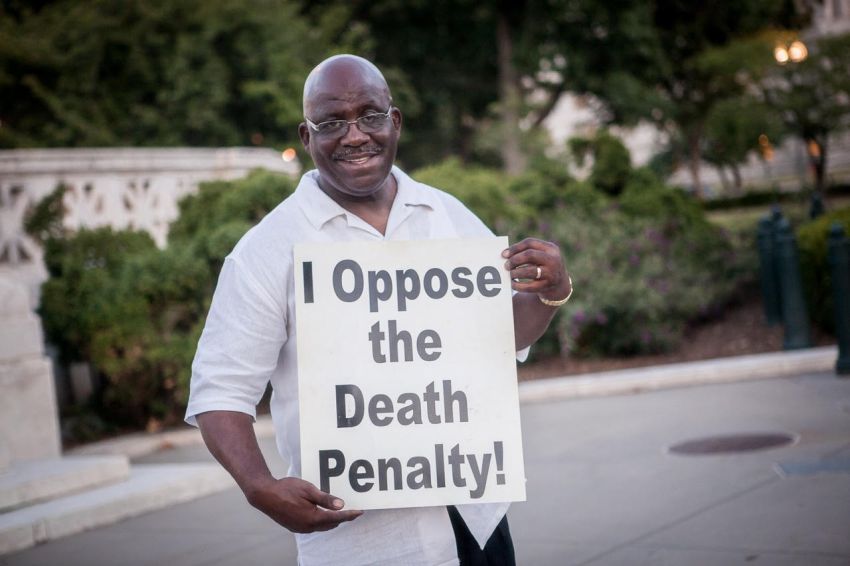
Some governments are celebrating that more countries have abolished the death penalty. Don’t listen to them. As I write this, 11 people are on death row in the United States and Amnesty reports 883 people were executed in 20 countries last year — a 53% spike since the previous year.
For centuries, the death penalty has invoked deep divisions in many societies. Some countries still cling to the archaic form of punishment. However, there is a glimmer of hope; while executions have risen, the number of countries using the death penalty has dropped. One hundred and twelve 112 countries have abolished it and another 32 no longer perform executions.
This shift has primarily been driven by strong, organised people-powered action, not government initiatives. Individuals and organisations are taking collective action to exert pressure on governments and corporations that support, or engage in, capital punishment.
In an era of greater global interconnectedness, people have become more aware of the ethical implications of their choices. They are using this to influence the behavior of businesses and governments, alike.
Lethal injection drugs has been a target of consumer action. In 2016, Pfizer, one of the world’s largest pharmaceutical corporations, announced a comprehensive policy to restrict the distribution of its drugs for use in lethal injections. This move was in response to pressure from activists and organisations pushing to abolish the death penalty.
Pfizer’s policy prohibited the use of its products, including drugs such as midazolam and pancuronium bromide, in executions. It also implemented distribution controls to prevent these drugs from reaching correctional facilities, where lethal injections were carried out.
The campaign to push pharmaceutical companies to take action involved a multi-pronged approach. Activists and advocacy groups, such as Reprieve and the American Civil Liberties Union, organised public protests, launched online petitions and engaged in media campaigns.
Legal avenues were also pursued to challenge the sourcing and use of these drugs. Lawsuits were filed to expose potential violations of regulations and to question the ethics of pharmaceutical companies’ involvement in executions. The legal challenges sought to hold companies accountable for their complicity in perpetuating the death penalty.
The campaign and the response from pharmaceutical companies, like Pfizer, had a significant impact. Governments faced mounting difficulties in obtaining the necessary drugs for lethal injections, as major suppliers became unwilling to provide them. This disruption in the supply chain created practical obstacles and forced governments to confront the feasibility and ethics of carrying out executions.
The campaign targeted specific pharmaceutical companies to disrupt the support system for capital punishment. It underscored the role of corporate responsibility and ethical considerations in shaping public opinion and policy.
Activists demonstrated that consumer activism can effectively influence even the largest corporations and contribute to the global trend towards the abolition of the death penalty.
Grassroots organising
Grassroots organising has become a potent force in the fight against the death penalty. Movements of citizens, activists and civil society organizations have been pivotal in raising awareness, mobilising support and pushing for law reform.
Grassroots organisations have humanised the issue by sharing stories of wrongful convictions, highlighting the inherent biases within the criminal justice system and exposing the fallibility of capital punishment.
The United States-based National Coalition to Abolish the Death Penalty (NCADP) is a prominent example of a coalition that brings together diverse organizations, including civil rights groups, religious organizations and legal advocates.
NCADP uses the combined expertise and resources of its member organizations to advocate for reforms, educate the public and support grassroots initiatives.
Grassroots campaigns place a strong emphasis on public awareness and education. For example, Witness to Innocence, a US-based organization campaigns around the injustices of the death penalty by sharing the stories of exonerated death row survivors.
Through public speaking engagements, media appearances, and educational events, Witness to Innocence highlights the risks of wrongful convictions and the irreversible nature of the death penalty, prompting critical public reflection.
The international initiative The Forgiveness Project is another. Through exhibitions, storytelling events and online resources, it shares stories of victims, perpetrators and families affected by the death penalty, fostering empathy, understanding and dialogue around the human impact of state-sanctioned executions.
Individuals' and communities’ grassroots initiatives, such as rallies, speaking tours and other public protests, to raise visibility, attract media attention and put pressure on authorities cannot do this alone.
Collaboration
They often collaborate with international human rights organisations, such as Amnesty International and Human Rights Watch, to coordinate efforts, including Journey of Hope – From Violence to Healing speaking tours. These collaborations in which individuals impacted by violence and the death penalty share their personal stories, challenge punitive approaches and advocate for restorative justice alternatives have helped strengthen the global network working towards abolition of the death penalty.
The World Coalition Against the Death Penalty, which includes more than 200 organisations, organises an annual World Day Against the Death Penalty.
It is clear that ordinary people, not politicians, are the driving force behind the campaign to abolish the death penalty. Progress in reducing the number of countries that employ capital punishment is a testament to the power of grassroots organising and consumer activism.
However, there is still work to be done, as some countries persist in using the death penalty. It is through our collective efforts that we can ensure a future where every life is valued and the death penalty is confined to the annals of history.
[Joel MacKay is a human rights activist, focusing on foreign affairs, First Nations justice, mental health reform and LGBTIQ rights.]